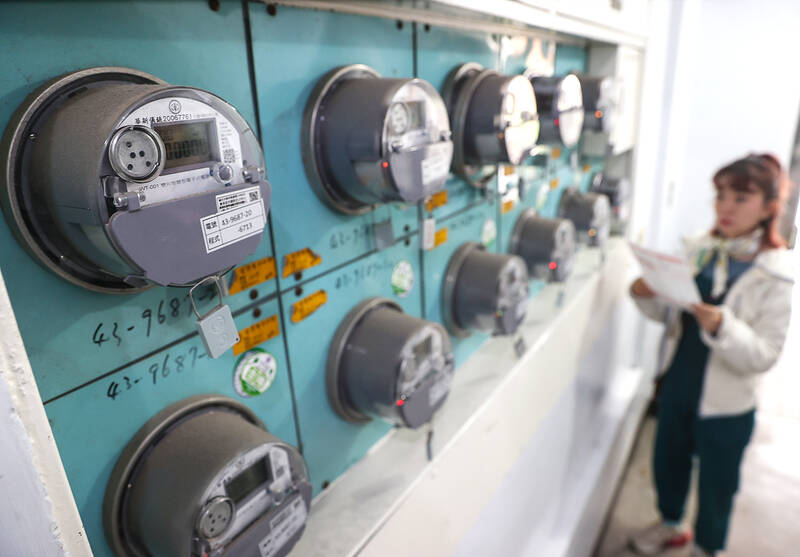Taiwan’s economic activity last month continued to gain support from inventory replenishment demand and rush orders ahead of the US government’s new tariffs, an electricity consumption survey by the Taiwan Research Institute (台灣綜合研究院) showed yesterday.
The Electricity Prosperity Index (EPI) compiled by the New Taipei City-based institute rose 0.15 percent last month from a year earlier, with overall electricity consumption signaling a booming “yellow-red” light for the 11th straight month, the institute said in a statement.
Since US President Donald Trump took office in January, he has announced a number of tariffs, including “reciprocal” tariffs on most trading partners, which have prompted global companies to replenish inventory and accelerate shipments before the tariffs officially take effect, the institute said.

Photo: CNA
“Taiwan’s semiconductor and electronics industries continue to benefit from the booming artificial intelligence [AI] development, which coupled with a surge in rush orders since early March, has driven production lines to operate at full capacity and supported the nation’s economic growth,” it said.
As a result, Taiwan’s economy likely expanded 3 percent year-on-year last month and 3.1 percent in the first quarter, the institute said.
The institute uses the EPI to gauge the health of the nation’s manufacturing and service sectors.
Last month, use of high-voltage power increased 1.49 percent year-on-year, with demand from the manufacturing sector rising 1.69 percent, while service sector demand grew 0.37 percent, it said.
Power consumption by semiconductor firms last month rose 9.46 percent from a year earlier on strong demand for AI and high-performance computing applications, while electricity consumption by suppliers of computers, electronic goods and optical products grew 10.87 percent, as the global AI server market is thriving and looking to expand further going forward, the institute said.
However, chemical material producers saw power consumption decline 3.22 percent annually last month due to rising competition from foreign peers and global overcapacity, it said.
Suppliers of steel products were also affected by the US tariffs, as well as pricing competition from Chinese and Southeast Asian rivals, with their electricity use declining 8 percent last month compared with the same period last year, it added.
Overall, the arrival of recent rush orders highlights not only Taiwan’s strategic role in the global technology supply chain, but also the risks brought about by the uncertainty of the US tariff policy, which warrants further observation, the institute said.

Chizuko Kimura has become the first female sushi chef in the world to win a Michelin star, fulfilling a promise she made to her dying husband to continue his legacy. The 54-year-old Japanese chef regained the Michelin star her late husband, Shunei Kimura, won three years ago for their Sushi Shunei restaurant in Paris. For Shunei Kimura, the star was a dream come true. However, the joy was short-lived. He died from cancer just three months later in June 2022. He was 65. The following year, the restaurant in the heart of Montmartre lost its star rating. Chizuko Kimura insisted that the new star is still down

While China’s leaders use their economic and political might to fight US President Donald Trump’s trade war “to the end,” its army of social media soldiers are embarking on a more humorous campaign online. Trump’s tariff blitz has seen Washington and Beijing impose eye-watering duties on imports from the other, fanning a standoff between the economic superpowers that has sparked global recession fears and sent markets into a tailspin. Trump says his policy is a response to years of being “ripped off” by other countries and aims to bring manufacturing to the US, forcing companies to employ US workers. However, China’s online warriors

Application-specific integrated circuit designer Faraday Technology Corp (智原) yesterday said that although revenue this quarter would decline 30 percent from last quarter, it retained its full-year forecast of revenue growth of 100 percent. The company attributed the quarterly drop to a slowdown in customers’ production of chips using Faraday’s advanced packaging technology. The company is still confident about its revenue growth this year, given its strong “design-win” — or the projects it won to help customers design their chips, Faraday president Steve Wang (王國雍) told an online earnings conference. “The design-win this year is better than we expected. We believe we will win

Intel Corp chief executive officer Lip-Bu Tan (陳立武) is expected to meet with Taiwanese suppliers next month in conjunction with the opening of the Computex Taipei trade show, supply chain sources said on Monday. The visit, the first for Tan to Taiwan since assuming his new post last month, would be aimed at enhancing Intel’s ties with suppliers in Taiwan as he attempts to help turn around the struggling US chipmaker, the sources said. Tan is to hold a banquet to celebrate Intel’s 40-year presence in Taiwan before Computex opens on May 20 and invite dozens of Taiwanese suppliers to exchange views